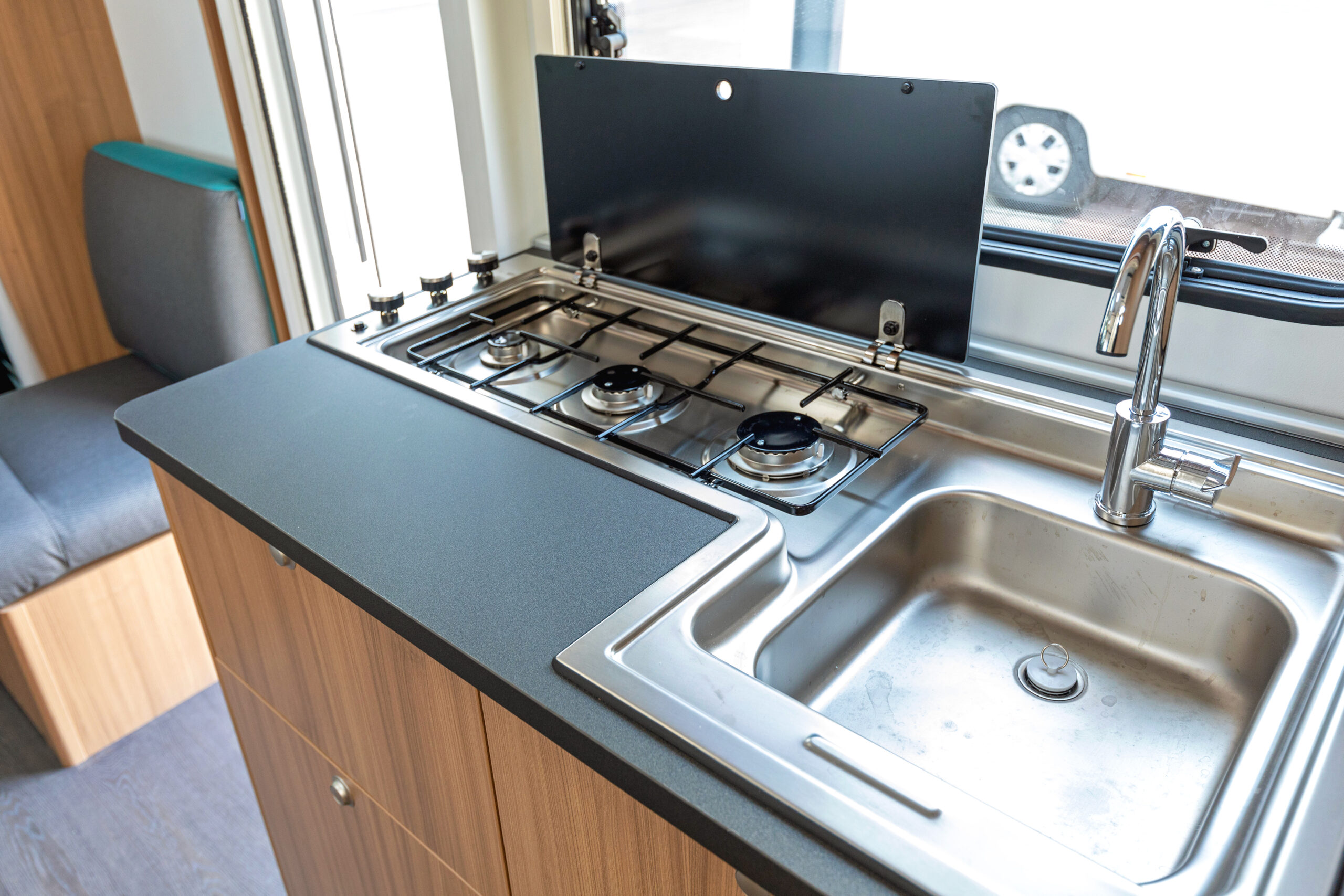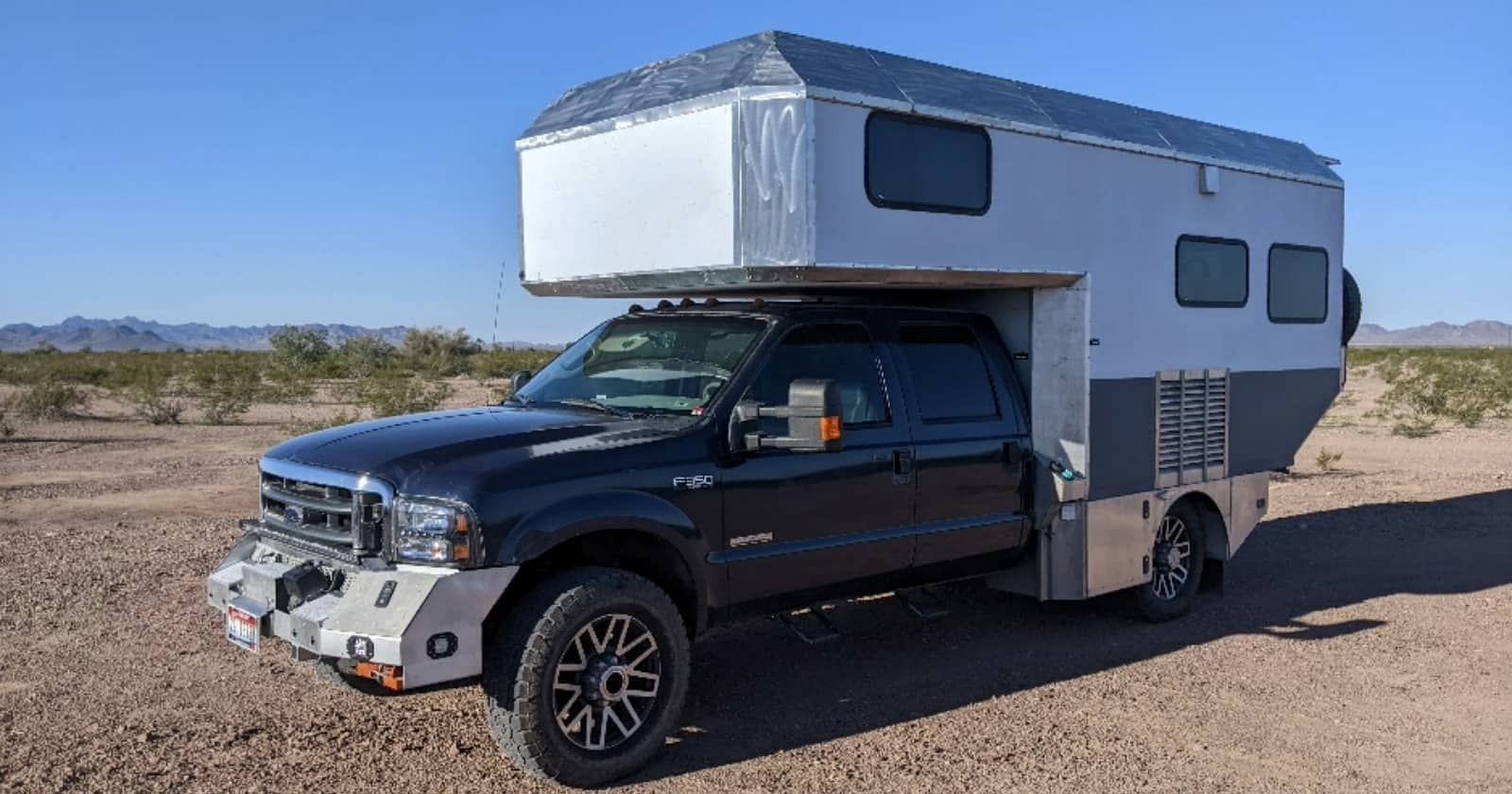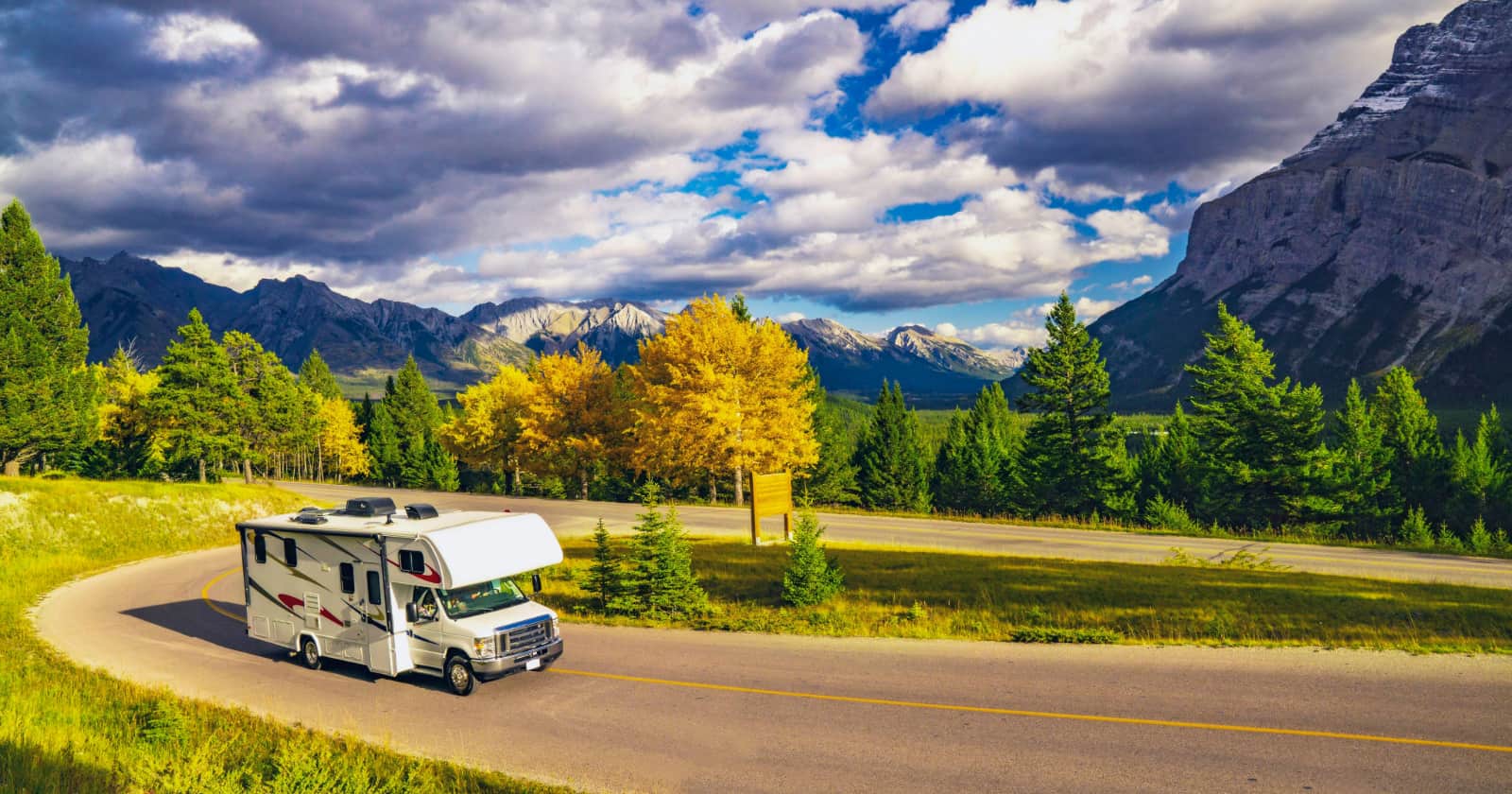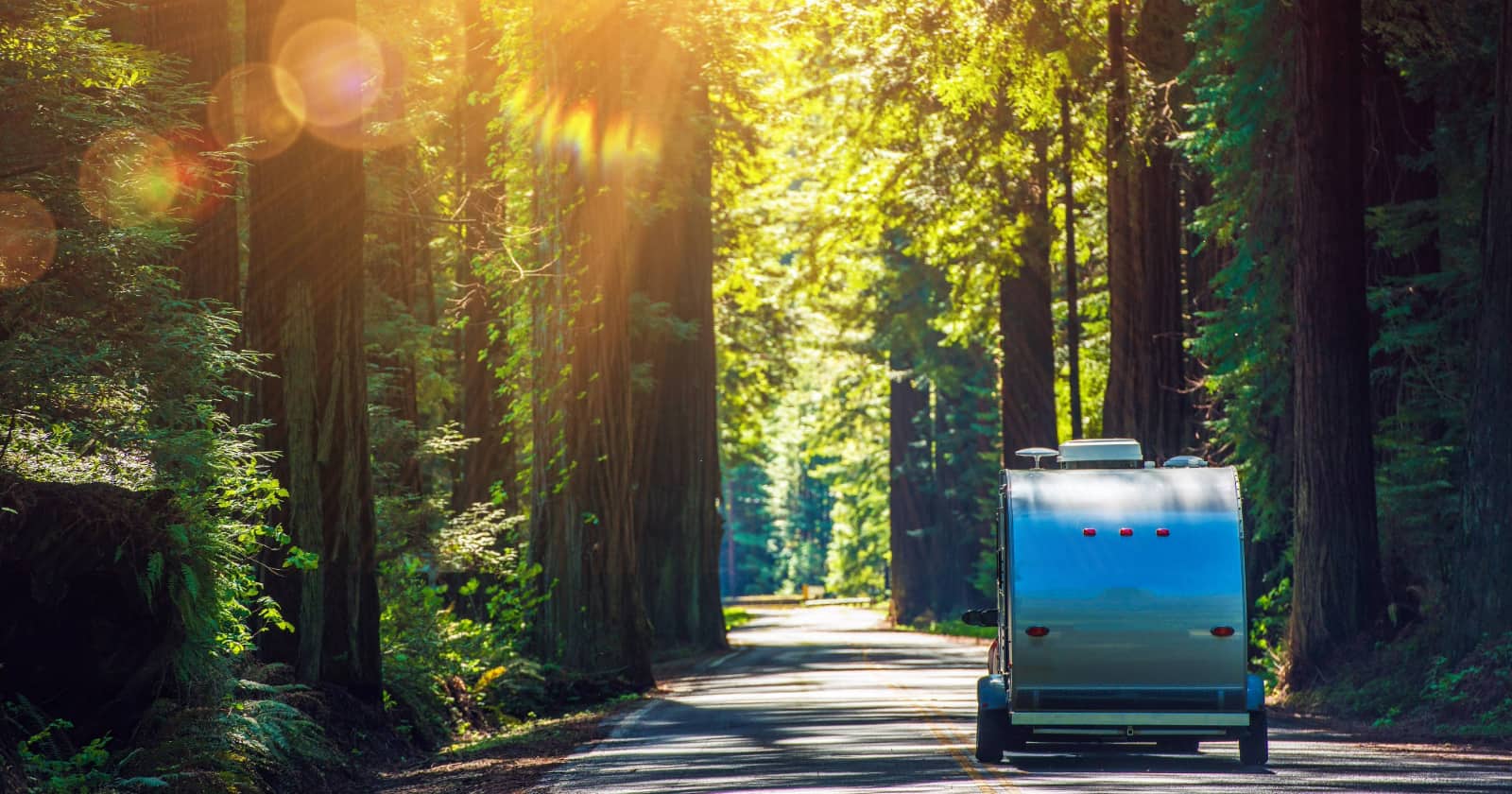
What Are The Best Materials For Lightweight RV Countertops?
Whether it’s a DIY project, or you are having it done by a pro, if you’re replacing countertops in your RV, weight should be considered.
Stones such as granite, marble, and onyx are common materials for residential countertops. Although beautiful, they are very heavy and can be susceptible to cracking through movement.
Large Class A motorhomes do use some of these natural stones successfully due to their heavy, high-end suspensions and smooth ride. For the average travel trailer, fifth wheel, camper van, and smaller motorhomes, natural stone isn’t a great option.
People use concrete, solid wood, and epoxies for countertops. If it’s flat and can support the weight, you could use it, but what are the best materials for lightweight RV countertops?
Laminate countertops
Laminate is probably the most common countertop material. The countertop itself is generally a particleboard material that is then covered with laminate by adhering it to the particleboard base.
The laminate itself is a combination of kraft paper, resins, and the decorative layer coated with a clear protective coating. It is a hard thin sheet that is bendable but brittle when not adhered to a sheet of particleboard or similar product.
The plastic laminate itself is extremely light, but as mentioned, needs a base to complete the countertop and so 3/4″ particleboard is the most commonly used material.
For DIYers, if you are looking at lightweight RV countertops, this is also a doable option. Premade lengths are available, and making your own is surprisingly easy with the right tools and some basic know-how.
Pros
- Lightweight: Finished countertops are approximately 3-4 pounds per square foot, making them the lightest option.
- Cost: Laminate tops are also one of the cheapest options for countertops. Different options for the edges and backsplash will affect the price, but the average is $25 per linear foot installed.
- Maintenance: Plastic laminate is a nonporous material, so it is not affected by spills and is easily wiped clean of any mess.
- Options: Since this is a man-made product, the options for colors and patterns are almost endless.
- Ease of install: Because of the particleboard or wood base, they are able to be screwed directly to the cabinets from below. Any notches or scribe cuts needed for a snug fit are easily made.
Cons
- Water damage: Although the laminate itself is water-resistant, the base is not. Leaks around the sink or any water that comes in contact with particleboard will cause it to swell and rot if not caught immediately.
- Sink options: Due to the fact that the base material must be kept dry, it is not advisable to use an under-mount sink with laminate countertops.
- Scratches: Plastic laminate is actually very durable, however, if it does get a deep scratch, it is there to stay. The layer under the decorative top layer is dark brown, so it will show up especially in lighter colors.
Solid surface
Solid surface countertops, also often called Corian tops after one of the major manufacturers, is a synthetic top very popular in residential and newer RVs. RV manufacturers use this material because it is suitable for lightweight RV countertops.
They are made from mineral dust and particles mixed with a variety of plastic resins and pigments. They are as the name implies, a solid surface available in many colors and patterns, some with a natural stone look.
Solid surface is very close in weight to laminate tops, averaging 4-5 pounds per square foot. The big difference is whereas the laminate tops will generally be 3/4″, solid surface tops are only 1/2″ thick.
Not as easy for DIYers, solid surface construction requires some special adhesive and lots of clamps. The process includes lots of sanding and can be very dusty.
It is also sold in 30″ by 144″ sheets, which are not easy to handle without multiple people.
Pros
- Weight: At 1/2″ thick, solid surface is light and strong, making it great for countertops.
- Durability: Solid surface tops are nonporous, so they are great for spills. They are also durable for light scratches, and since the material is a solid color, any scratches or chips can be repaired with no evidence of the repair.
- Style: Being a man-made product with some natural stone traces embedded in it, solid surface tops can be made to look a lot like natural stone. The color match adhesives provide seamless joints and transitions.
- Sink options: The solid material allows for top or bottom mount sinks, and even sinks made from the material give a solid one-piece look to the countertop and sink.
Cons
- Cost: Still reasonable compared to a natural stone, solid surface is approximately double laminate at an average of $50 per square foot installed.
- Non DIY: Solid surface is doable for some people, but it is much more likely you will have it at least fabricated by a professional shop.
Pine
Wooden tops are popular and there are lots of different types of wood to use. However, most that are durable are heavier. Butcher block-style tops are beautiful, but again, heavy.
Pine is lightweight and some people love the knotty look when finished. Pine is cheap and easy to work with, but it is a very soft wood and susceptible to damage from sharp items or dings and dents from hard or heavy objects.
Thick layers of resin can be used to build it up but will add to the weight. The finish will also have to be maintained to prevent water damage and stains from your red wine.
Pros
- Weight: The thickness of pine countertops can vary from as thin as 5/8″ to 1 1/2″ for butcher block style. This will determine the weight, however, pine is one of the lightest wood species.
- Natural look: The natural raw look of pine never seems to go out of style. People have been using it forever, and even modern designs are incorporating pine.
- Easy to work with: For DIY projects, pine is probably the easiest wood to work with. It is lightweight, sands and cuts easily, and the smell is great. Joining solid wood will require some woodworking tools and know-how, but it is a project completed by lots of RVers.
Cons
- Softer surface: Pine is light because it is soft. This makes it susceptible to dings and scratches. Clear coatings should be applied to help with durability.
- Maintenance: If natural wood is used, it has to be finished to keep it durable, and these finishes will require reapplying at some point. Unfinished pine won’t stand up to stains or water.
Stainless steel
Although not common in RV applications, stainless steel is a lightweight countertop option. Thin pieces of stainless steel are fabricated to fit over plywood in most cases for a clean durable finish.
Stainless steel is most popular with restaurants and professional kitchens for its ease of clean-up and food-safe properties. Installation in an RV is not very likely due to the labor involved in fabrication and higher cost as a result.
Switching up your outdated RV countertops can change the feel of your RV. As with any project, the most important part is planning. If your old tops are in good shape, this can be a great template for your new lightweight RV countertops. This can also be the time to change the layout and gain some much-needed counter space!
RVers looking for valuable how-to information have learned to go to the experts. Forums such as iRV2.com and blog sites like RV LIFE, Do It Yourself RV, and Camper Report provide all the information you need to enjoy your RV. You’ll also find brand-specific information on additional forums like Air Forums, Forest River Forums, and Jayco Owners Forum.
Continue reading:



